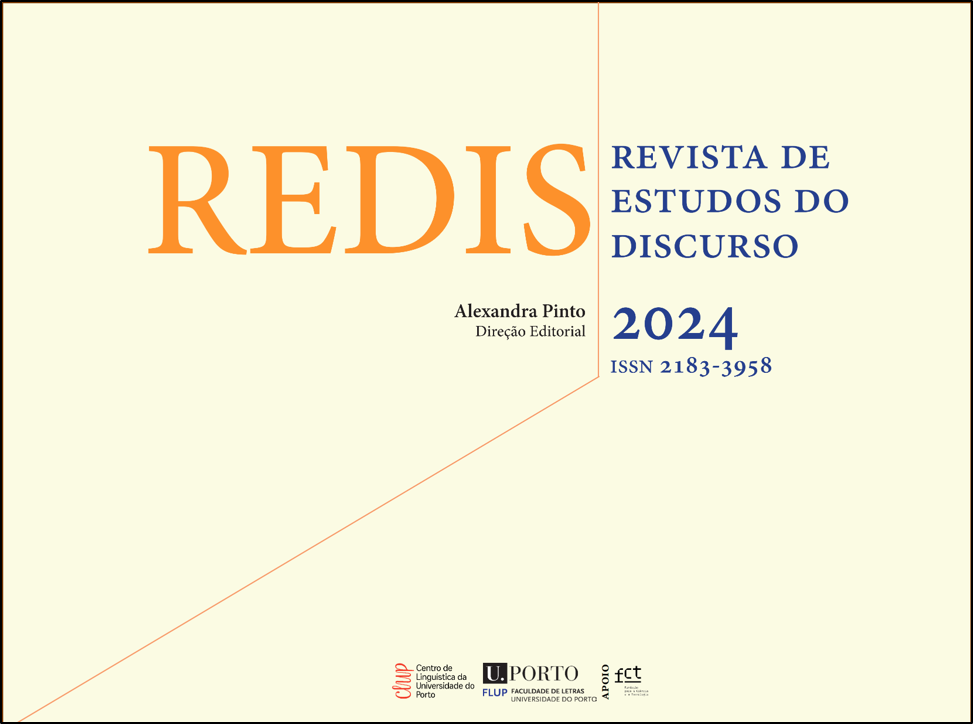Controversy and Disagreement Among Online Newspaper Readers: An Analysis Procedure to Characterize Verbal Violence
DOI:
https://doi.org/10.21747/21833958/red15a4Keywords:
Disagreement, Folha de S.Paulo, Impoliteness, Controversy, Verbal violenceAbstract
This article aims to discuss an analysis procedure for verbal violence, correlating interactional and rhetorical-discursive aspects related to its emergence conditions, especially controversy and disagreement, and its manifestation forms, in terms of impoliteness and appraisal. Theoretically, the conceptions of controversy, disagreement, and agreement are grounded in rhetorical and discursive approaches (Perelman; Olbrechts-Tyteca, 2020; Kerbrat-Orecchioni, 1980; Amossy, 2017; Neves, 2017). The manifestations of verbal violence will consider Culpeper's (1996; 2005; 2011) impoliteness theory and the attitude and graduation subsystems of the appraisal system (Martin; White, 2005) from a systemic-functional perspective (Halliday & Matthiessen, 2004). The corpus, selected to illustrate the method, comprises comments from the online newspaper Folha de S.Paulo regarding the issue of abortion, a potentially controversial topic. Initial analysis results have shown the productivity of our model to refine the description of verbal violence acts. We have observed the importance of disagreement between values and value hierarchies for the emergence of verbal violence and the high incidence of attitude instances linked to judgments of social sanction, scoped by high intensification resources, as an evaluation strategy in response to disagreements.
References
Amossy, R. (2017). Apologia da polêmica. Contexto.
Azevedo, I. C. M. de, Gonçalves-Segundo, P. R., & Piris, E. L. (2021). Argumentação erística nas interações digitais: uma polêmica médica sobre a cloroquina no Debate 360 da CNN Brasil. Revista Estudos Linguísticos, 29(4), 2289-2333.
Bertucci, M. M., & Boyer, I. (2013). “Ta mère elle est tellement... ” joutes verbales et insultes rituelles chez les adolescents de l'immigration francophone. Adolescence, 31(3), 711-721. https://doi.org/10.3917/ado.085.0711.
Bousfield, D. (2008). Impoliteness in the struggle for power. In D. Bousfield & M. A. Locher (Eds.), Impoliteness in language: Studies on its interplay with power in theory and practice (pp. 127-153). Mouton de Gruyter.
Culpeper, J. (1996). Towards an anatomy of impoliteness. Journal of Pragmatics, 25(3), 349-367.
Culpeper, J. (2005). Impoliteness and entertainment in the television quiz show: The Weakest Link. Journal of Politeness Research, 1(1), 35-72.
Culpeper, J. (2011). Impoliteness: Using language to cause offence. Cambridge University Press.
Fuzer, C., & Cabral, S. R. S. (2014). Introdução à gramática sistêmico-funcional em Língua Portuguesa. Mercado de Letras.
Gonçalves-Segundo, P. R. (2011). Tradição, dinamicidade e estabilidade nas práticas discursivas: um estudo da negociação intersubjetiva na imprensa paulistana. [Tese de doutorado. Universidade de São Paulo].
Halliday, M. A. K., & Matthiessen, C. M. I. M. (2004). An Introduction to Functional Grammar (3a ed). Hodder Arnold.
Kayany, J. (1998). Contexts of uninhibited online behavior: Flaming in social newsgroups on Usenet. Journal of the American Society for Information Science, 49(12), 1135-1141.
Kerbrat-Orecchioni, C. (1980). La polémique et sés définitions. In N. Gelas & C. Kerbrat-Orecchioni (org.), Le discours polémique (pp. 3-40). Presses Universitaires de Lyon.
King, A. A., & Floyd, D. A. (1971). Nixon, Agnew, and the “Silent Majority”: A case study in the rhetoric of polarization. Western Speech, 35(4), 243-255.
Martin, J., & White, P. (2005). The language of evaluation: appraisal in English. Palgrave Macmillan.
Melo, M. S. de S. (2020). Da polêmica aos discursos de ódio: Um estudo da recepção no Twitter sob a perspectiva semiolinguística. Revista de Estudos da Linguagem, 28(4), 1959-1982. https://doi.org/10.17851/2237-2083.28.4.1959-1982.
Moïse, C. (2011). Gros mots et insultes des adolescents. Revue de l'Enfance et de l'Adolescence, 83-84(1), 29-37. https://doi.org/10.3917/lett.083.0029.
Downloads
Published
How to Cite
Issue
Section
License
Copyright (c) 2024 Adelmo Cordeiro Galindo, Paulo Roberto Gonçalves-Segundo

This work is licensed under a Creative Commons Attribution 4.0 International License.
The authors give to REDIS. Revista de Estudos do Discurso the exclusive right to publish its texts, in any medium, including their reproduction and sale in paper or digital format, as well as their availability in a free access regime in databases.
















